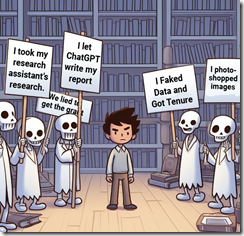Bogus Research Papers: They Are Here to Stay
November 27, 2023
 This essay is the work of a dumb dinobaby. No smart software required.
This essay is the work of a dumb dinobaby. No smart software required.
“Science Is Littered with Zombie Studies. Here’s How to Stop Their Spread” is a Don Quixote-type write up. The good Don went to war against windmills. The windmills did not care. The people watching Don and his trusty sidekick did not care, and many found the site of a person of stature trying to gore a mill somewhat amusing.
A young researcher meets the ghosts of fake, distorted, and bogus information. These artefacts of a loss of ethical fabric wrap themselves around the peer-reviewed research available in many libraries and in for-fee online databases. When was the last time you spotted a correction to a paper in an online database? Thanks, MSFT Copilot. After several tries I got ghosts in a library. Wow, that was a task.
Fake research, non-reproducible research, and intellectual cheating like the exemplars at Harvard’s ethic department and the carpetland of Stanford’s former president’s office seem commonplace today.
The Hill’s article states:
Just by citing a zombie publication, new research becomes infected: A single unreliable citation can threaten the reliability of the research that cites it, and that infection can cascade, spreading across hundreds of papers. A 2019 paper on childhood cancer, for example, cites 51 different retracted papers, making its research likely impossible to salvage. For the scientific record to be a record of the best available knowledge, we need to take a knowledge maintenance perspective on the scholarly literature.
The idea is interesting. It shares a bit of technical debt (the costs accrued by not fixing up older technology) and some of the GenX, GenY, and GenZ notions of “what’s right.” The article sidesteps a couple of thorny bushes on its way to the Promised Land of Integrity.
First, the academic paper is designed to accomplish several things. First, it is a demonstration of one’s knowledge value. “Hey, my peers said this paper was fit to publish” some authors say. Yeah, as a former peer reviewer, I want to tell you that harsh criticism is not what the professional publisher wanted. These papers mean income. Don’t screw up the cash flow,” was the message I heard.
Second, the professional publisher certainly does not want to spend the resources (time and money) required to do crapola archeology. The focus of a professional publisher is to make money by publishing information to niche markets and charging as much money as possible for that information. Academic accuracy, ethics, and idealistic hand waving are not part of the Officers’ Meetings at some professional publisher off-sites. The focus is on cost reduction, market capture, and beating the well-known cousins in other companies who compete with one another. The goal is not the best life partner; the objective is revenue and profit margin.
Third, the academic bureaucracy has to keep alive the mechanisms for brain stratification. Therefore, publishing something “groundbreaking” in a blog or putting the information in a TikTok simply does not count. In fact, despite the brilliance of the information, the vehicle is not accepted. No modern institution building its global reputation and its financial services revenue wants to accept a person unless that individual has been published in a peer reviewed journal of note. Therefore, no one wants to look at data or a paper. The attention is on the paper’s appearing in the peer reviewed journal.
Who pays for this knowledge garbage? The answer is [a] libraries who have to “get” the journals departments identify as significant, [b] the US government which funds quite a bit of baloney and hocus pocus research via grants, [c] the authors of the paper who have to pay for proofs, corrections, and goodness knows what else before the paper is enshrined in a peer-reviewed journal.
Who fixes the baloney? No one. The content is either accepted as accurate and never verified or the researcher cites that which is perceived as important. Who wants to criticize one’s doctoral advisor?
News flash: The prevalence and amount of crapola is unlikely to change. In fact, with the easy availability of smart software, the volume of bad scholarly information is likely to increase. Only the disinformation entities working for nation states hostile to the US of A will outpace US academics in the generation of bogus information.
Net net: The wise researcher will need to verify a lot. But that’s work. So there we are.
Stephen E Arnold, November 27, 2023



